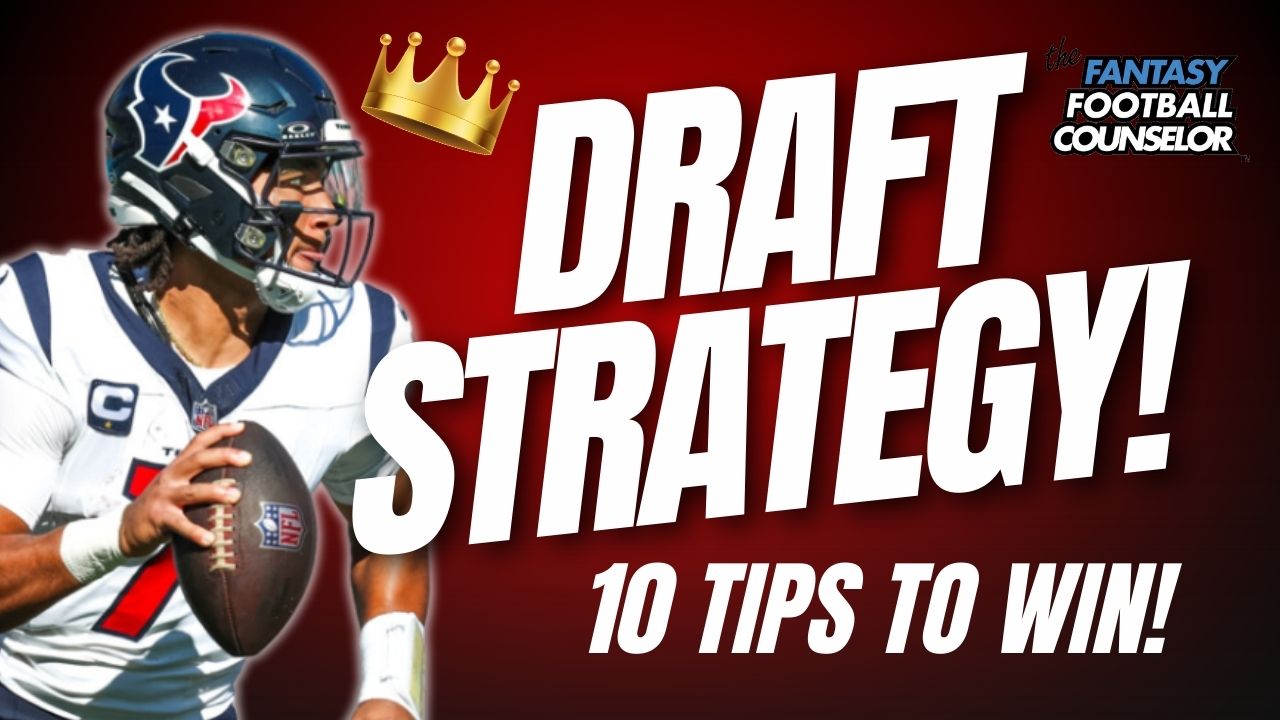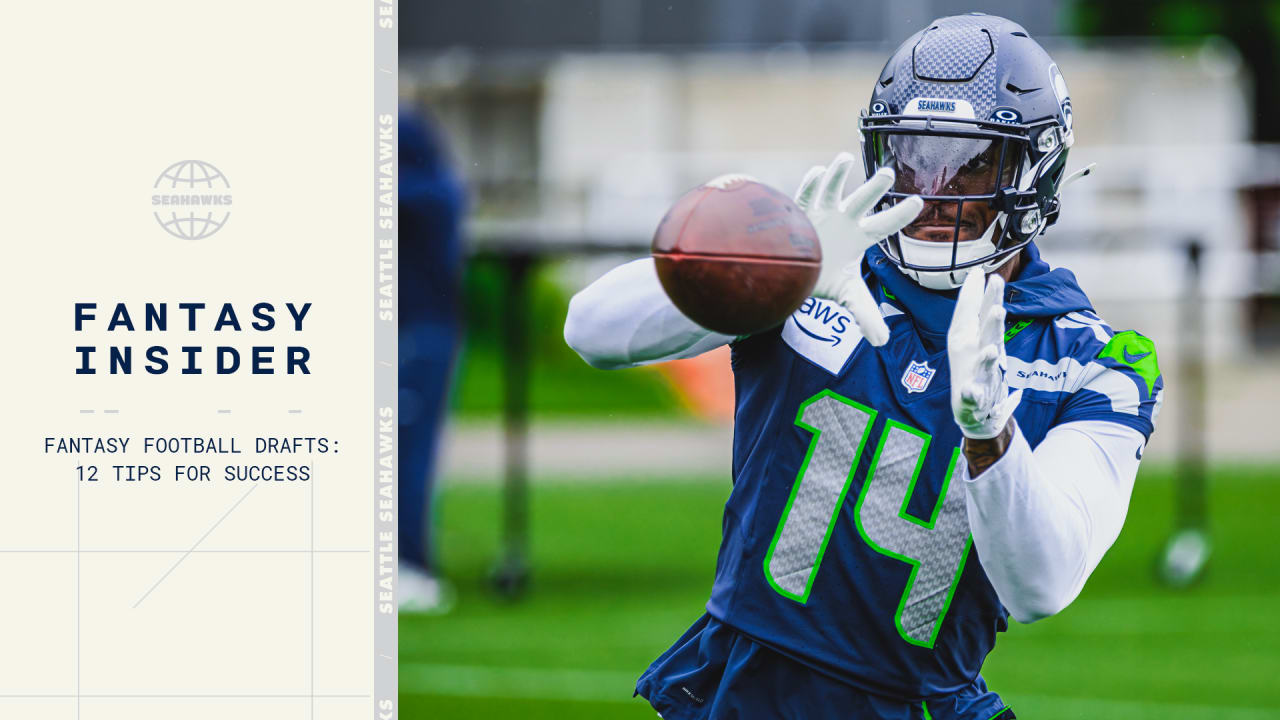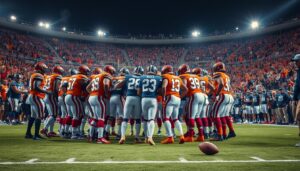Draft top players early and monitor the waiver wire closely. Keep an eye on player injuries and bye weeks.
NFL Fantasy Football requires strategic planning and constant monitoring. Drafting top-tier players is crucial for a strong foundation. Stay updated on player performances and injuries to make informed decisions. The waiver wire is a goldmine for potential breakout stars. Balancing your roster with a mix of reliable starters and high-upside bench players can give you an edge.
Pay attention to bye weeks to avoid lineup gaps. Regularly adjust your lineup based on matchups and emerging trends. Consistent research and adaptation to new information are key to staying competitive throughout the season.

Credit: thefantasyfootballcounselor.com
Draft Strategy
Fantasy football is a fun and competitive way to enjoy the NFL season. Winning requires a solid draft strategy. Your draft can set the tone for your entire season. This blog will cover key tips to help you dominate your fantasy football draft.
Player Rankings
Player rankings are essential for a successful draft. Knowing who the top players are can help you make informed decisions. Here are some tips:
- Follow Expert Rankings: Many websites offer expert rankings. Use these to guide your picks.
- Consider Player Consistency: Look for players who consistently perform well. Consistency can be more valuable than a few high-scoring games.
- Check Injury Reports: Injuries can derail your team. Avoid drafting players with a history of injuries.
A table can also help you keep track of player rankings:
| Rank | Player | Position | Team |
|---|---|---|---|
| 1 | Christian McCaffrey | RB | Carolina Panthers |
| 2 | Dalvin Cook | RB | Minnesota Vikings |
| 3 | Derrick Henry | RB | Tennessee Titans |
Rankings can change weekly. Stay updated to ensure you make the best picks.
Mock Drafts
Participating in mock drafts is one of the best ways to prepare for your actual draft. Mock drafts simulate the real draft experience and help you practice your strategy. Here are some tips for making the most of mock drafts:
- Practice with Different Draft Positions: Drafting from different positions can help you understand the dynamics of each spot. This practice makes you adaptable on draft day.
- Experiment with Different Strategies: Try various strategies, like zero-RB or heavy-RB, to see what works best. This experimentation can help you find the best approach.
- Pay Attention to ADP (Average Draft Position): Knowing where players are typically drafted can help you make better decisions. ADP can guide you on when to pick certain players.
Mock drafts also help you get familiar with the drafting platform. This familiarity can save you time and reduce stress during the real draft. Use mock drafts to refine your strategy and build confidence.

Credit: m.youtube.com
Injury Management
In the world of NFL Fantasy Football, injury management is crucial. Injuries can derail your fantasy season. Properly handling injuries helps keep your team competitive. Let’s dive into some key strategies for managing injuries effectively.
Tracking Injuries
Keeping track of player injuries is essential. It helps you make informed decisions. Use reliable sources for injury updates.
Here are some tips for tracking injuries:
- Follow official NFL injury reports for the most accurate information.
- Use fantasy football apps that offer real-time injury updates.
- Set up alerts on your phone for instant notifications.
- Monitor player practice reports during the week.
- Pay attention to game-time decisions for last-minute changes.
Here’s a quick comparison of popular sources:
| Source | Reliability | Update Frequency |
|---|---|---|
| Official NFL Site | High | Daily |
| ESPN Fantasy App | High | Real-time |
| Rotoworld | Medium | Hourly |
Handcuff Players
Handcuffing players is another smart strategy. It means having a backup player for your star.
Here are some benefits of handcuffing players:
- Protects your team if a star player gets injured.
- Ensures you have a starter for your lineup.
- Minimizes the impact of injuries on your team.
Consider these top handcuff options:
| Star Player | Handcuff Player | Team |
|---|---|---|
| Dalvin Cook | Alexander Mattison | Minnesota Vikings |
| Ezekiel Elliott | Tony Pollard | Dallas Cowboys |
| Christian McCaffrey | Chuba Hubbard | Carolina Panthers |
By handcuffing players, you prepare for the unexpected. It keeps your team strong and competitive throughout the season.
Waiver Wire
Playing NFL Fantasy Football can be exciting. One crucial element is the Waiver Wire. This tool helps you pick up new players who aren’t on anyone’s team. You can find hidden gems and improve your squad. Let’s explore how to use the Waiver Wire effectively.
Finding Gems
Finding gems on the Waiver Wire is like searching for treasure. Some players can turn your season around. Here are some tips to help you spot those hidden stars:
- Check Player Stats: Look at player performance over the last few weeks. Consistent performance is key.
- Consider Injuries: Injuries can open up opportunities for backup players. These backups can become valuable starters.
- Team Matchups: Analyze upcoming games. Some players perform better against weaker defenses.
Another effective method is to use a table to track potential gems:
| Player Name | Position | Recent Points | Upcoming Matchups |
|---|---|---|---|
| John Doe | RB | 15, 20, 18 | Team A, Team B, Team C |
| Jane Smith | WR | 12, 14, 19 | Team D, Team E, Team F |
Timing Your Claims
Timing your claims is crucial in NFL Fantasy Football. Making the right move at the right time can make a big difference. Follow these guidelines to perfect your timing:
- Monitor Waiver Deadlines: Each league has specific waiver deadlines. Set reminders to stay on top of them.
- Early Bird Gets the Worm: Make your claims as soon as the waiver period opens. This increases your chances of snagging top players.
- Watch for Injuries: Injuries often lead to sudden availability of key players. Keep an eye on injury reports.
Using a strategic approach can help:
- Identify high-potential players early in the week.
- Submit your claims before the deadline.
- Stay updated on team news and injury reports.
Following these steps ensures you never miss an opportunity. Stay proactive and keep improving your team.

Credit: www.seahawks.com
Start/sit Decisions
Making the right start/sit decisions in NFL Fantasy Football can make or break your week. Choosing the correct players to start and who to sit involves a mix of strategy, research, and sometimes a bit of luck. By analyzing matchups and understanding player performance trends, you can make more informed decisions to maximize your fantasy points.
Matchup Analysis
Analyzing matchups is crucial for making the best start/sit decisions. Each team has strengths and weaknesses that can impact player performance. Here are some key factors to consider:
- Defensive Rankings: Check how opposing defenses rank against the run, pass, and specific positions.
- Injury Reports: Injuries can weaken defenses, making certain matchups more favorable.
- Home vs. Away: Players often perform better at home due to familiar conditions and fan support.
Use these factors to identify favorable and unfavorable matchups. For example, if your running back is facing a team with a weak run defense, it’s a good idea to start him. Conversely, if a wide receiver is up against a top-ranked pass defense, consider sitting him.
| Player | Opponent | Defensive Rank | Recommendation |
|---|---|---|---|
| John Doe | Team A | 25th against RB | Start |
| Jane Smith | Team B | 2nd against WR | Sit |
Player Performance Trends
Tracking player performance trends helps in making informed start/sit decisions. Pay attention to:
- Recent Performance: Look at the last few games to see if a player is on a hot streak.
- Consistency: Some players have high variability in their performance; others are more consistent.
- Matchup History: Check how players have performed against specific opponents in the past.
For instance, if a quarterback has been throwing multiple touchdowns in the last three games, he’s likely a good start. On the other hand, if a wide receiver has been struggling for several weeks, it might be wise to sit him.
Consider creating a simple tracking sheet to monitor these trends:
| Player | Last 3 Games | Consistency | Opponent History | Recommendation |
|---|---|---|---|---|
| Mike Johnson | 15, 20, 18 points | High | Good | Start |
| Lisa Brown | 5, 10, 8 points | Low | Poor | Sit |
Using these trends and matchup insights can significantly improve your start/sit decisions, giving you a better chance to win your fantasy football league.
Trade Tactics
Trading is a crucial part of NFL Fantasy Football. The right trade can win you the league. Understanding trade tactics helps you make the best decisions. Let’s dive into some smart strategies for trading.
Evaluating Offers
Evaluating trade offers is essential for a successful fantasy football season. Always consider the value of the players involved. Look at their performance, injuries, and upcoming matchups. A great player with tough upcoming games might not be the best trade.
Keep an eye on these key factors:
- Player Performance: Check their stats for consistency.
- Injury Reports: Ensure they are healthy and fit to play.
- Upcoming Matchups: Evaluate if they have easy or difficult games ahead.
- Team Dynamics: Understand how the player fits into their team’s strategy.
Use this simple table to compare player stats:
| Player | Average Points per Game | Injury Status | Next 3 Matchups |
|---|---|---|---|
| Player A | 15.3 | Healthy | Easy, Medium, Hard |
| Player B | 12.7 | Questionable | Medium, Hard, Easy |
Check if the offer improves your team. Never trade just for the sake of trading. Aim for a win-win situation where both parties benefit.
Targeting Needs
Targeting needs is critical in fantasy football trading. Identify your team’s weaknesses. Do you need a stronger running back or a more reliable wide receiver? Focus on these areas.
Follow these steps:
- Analyze Your Roster: Check your team’s performance.
- Identify Weak Spots: Find positions where your players underperform.
- Research Potential Trades: Look for players who can fill these gaps.
Example:
If your running backs are weak, target a team with surplus running backs. Offer them a good wide receiver if they need one. This way, both teams improve.
Here’s a quick checklist:
- Your Team’s Weaknesses: Know where you need improvement.
- Other Teams’ Needs: Understand what other teams lack.
- Potential Trade Partners: Identify teams that have what you need.
Communicate clearly with potential trade partners. Explain how the trade benefits both sides. Propose fair trades that meet both teams’ needs. Monitor the market and adjust your strategy as the season progresses.
Scoring System
Fantasy football offers a thrilling way to engage with the NFL season. Understanding the scoring system is key to mastering your fantasy league. The scoring system determines how players earn points, which impacts your draft strategy and in-season management. Let’s dive into the details to help you make the most informed decisions.
Standard Vs Ppr
Two of the most common scoring systems in fantasy football are Standard and PPR (Points Per Reception). Each system has unique rules that affect player value and performance.
Standard Scoring focuses on basic player stats. Points are awarded for touchdowns, yards gained, and field goals. This system is straightforward and often preferred by traditionalists.
- Touchdowns: 6 points
- Passing Yards: 1 point per 25 yards
- Rushing Yards: 1 point per 10 yards
- Field Goals: 3 points
In contrast, PPR Scoring adds an extra layer of complexity. It rewards players for each reception, making wide receivers and pass-catching running backs more valuable.
- Receptions: 1 point per reception
- All other points are similar to Standard Scoring
Here’s a quick comparison table:
| Action | Standard | PPR |
|---|---|---|
| Touchdown | 6 points | 6 points |
| Passing Yards | 1 point per 25 yards | 1 point per 25 yards |
| Rushing Yards | 1 point per 10 yards | 1 point per 10 yards |
| Reception | No points | 1 point per reception |
League Variations
Different leagues may adopt various scoring systems, altering player values and strategies. Understanding these variations helps you adapt and excel in your specific league.
Some common league variations include:
- Half-PPR: Similar to PPR but awards 0.5 points per reception.
- Bonus Points: Extra points for achieving certain milestones, like 100 rushing yards or 300 passing yards.
- Superflex: Allows an additional flex position, often including quarterbacks, increasing their value.
Leagues might also customize scoring for specific positions or actions. For example, they might give more points for longer field goals or reduce points for interceptions.
Here’s how some leagues might vary:
| Action | Custom Scoring |
|---|---|
| Field Goals (50+ yards) | 5 points |
| Interception | -2 points |
| 100 Rushing Yards | 3 bonus points |
Knowing your league’s specific scoring rules is essential. It helps you draft the right players and make better in-season decisions.
Team Management
Managing your NFL fantasy football team well can be the difference between victory and defeat. Effective team management involves making smart decisions weekly. This blog post will guide you through crucial tips for managing your fantasy football team effectively. Read on to learn more about weekly roster changes and bye week planning.
Weekly Roster Changes
Staying on top of weekly roster changes is essential for fantasy football success. Every week, you need to adjust your lineup based on player performance, injuries, and matchups. Here are some tips to help you with your weekly roster changes:
- Monitor Player Performance: Keep an eye on how your players are performing each week. Look for trends in their performance and make adjustments as needed.
- Stay Updated on Injuries: Injuries can derail your team’s performance. Check injury reports regularly and be ready to replace injured players.
- Evaluate Matchups: Some players perform better against certain teams. Consider the matchups each week and adjust your lineup to exploit favorable matchups.
- Utilize Waiver Wire: The waiver wire is a valuable resource. Look for players who are performing well and are available to add to your team.
Consider the following table for quick reference:
| Action | Description |
|---|---|
| Monitor Player Performance | Track weekly stats and trends |
| Check Injury Reports | Replace injured players promptly |
| Analyze Matchups | Adjust lineup based on opponent |
| Use Waiver Wire | Add high-performing available players |
Bye Week Planning
Bye week planning is a critical aspect of fantasy football team management. During the NFL season, each team has a bye week where they do not play. If you don’t plan for these bye weeks, you may find yourself without key players. Here’s how to handle bye weeks effectively:
- Know Your Players’ Bye Weeks: Keep a list of your players’ bye weeks. This helps you plan ahead and ensures you won’t be caught off guard.
- Plan Ahead: Look at your team’s schedule and identify when multiple players have bye weeks. Make necessary adjustments in advance.
- Use Bench Players: Have reliable bench players ready to step in during bye weeks. This keeps your team competitive even when starters are out.
- Consider Waiver Wire Options: During bye weeks, the waiver wire can be your best friend. Look for players with favorable matchups to fill in temporarily.
Here’s a simple checklist to help you with bye week planning:
- List all players and their bye weeks
- Identify potential scheduling conflicts
- Prepare bench players for bye week coverage
- Scan waiver wire for temporary replacements
Effective bye week planning ensures your team stays strong throughout the season. Use these tips to navigate bye weeks smoothly.
Engaging With Community
Playing NFL Fantasy Football becomes even more exciting when you engage with the community. Sharing tips, strategies, and insights with other enthusiasts can elevate your game. Engaging with the community offers valuable perspectives and keeps you updated with the latest trends.
Forums And Social Media
Forums and social media platforms are treasure troves of information. Here, you can discuss strategies, share insights, and get advice from other fantasy football fans. Popular forums like Reddit’s r/fantasyfootball offer a wealth of knowledge. You can ask questions, read threads, and learn from experienced players.
Social media platforms like Twitter and Facebook have dedicated groups and pages for fantasy football. Following key accounts can provide you with real-time updates, injury news, and expert opinions. Here’s a quick list of what you can do on social media:
- Join Facebook groups dedicated to NFL Fantasy Football.
- Follow Twitter accounts of fantasy football analysts.
- Participate in live Q&A sessions.
- Share your lineup for feedback and suggestions.
Here is a table of popular forums and social media accounts to follow:
| Platform | Link |
|---|---|
| r/fantasyfootball | |
| Fantasy Football Advice | |
| FantasyPros |
Expert Advice
Expert advice can significantly improve your fantasy football strategy. Experts have years of experience and provide in-depth analysis. Websites like FantasyPros, ESPN, and NFL.com offer expert rankings, projections, and articles.
Listening to podcasts is another excellent way to gain expert insights. Podcasts often feature interviews with top analysts and provide weekly tips. Some popular podcasts include:
- Fantasy Focus Football (ESPN)
- The Fantasy Footballers
- NFL Fantasy Live
Webinars and live streams hosted by experts also provide valuable information. These sessions allow you to ask questions and get real-time advice. Here’s how to make the most of expert advice:
- Read weekly articles and rankings.
- Listen to daily or weekly podcasts.
- Participate in live streams and webinars.
- Follow expert social media accounts for updates.
Engaging with experts helps you make informed decisions and stay ahead in your fantasy league.
Frequently Asked Questions
What Are Essential Nfl Fantasy Tips?
Research player stats and matchups. Stay updated with injury reports. Use waiver wire effectively. Monitor bye weeks.
How Do I Choose The Best Players?
Focus on consistent performers. Prioritize running backs and wide receivers. Check strength of schedule. Avoid biased choices.
When Should I Draft A Quarterback?
Draft quarterbacks in mid to late rounds. Prioritize skill positions first. Top-tier QBs can wait.
How Do Waiver Wires Work?
Waiver wire adds players not on rosters. Monitor weekly for potential stars. Prioritize based on team needs.
Conclusion
Mastering NFL fantasy football requires strategy and dedication. Use these tips to elevate your game and dominate your league. Stay updated with player stats and news. Make informed decisions each week. Your fantasy football success starts with smart choices and a keen eye for detail.
Enjoy the season and good luck!




